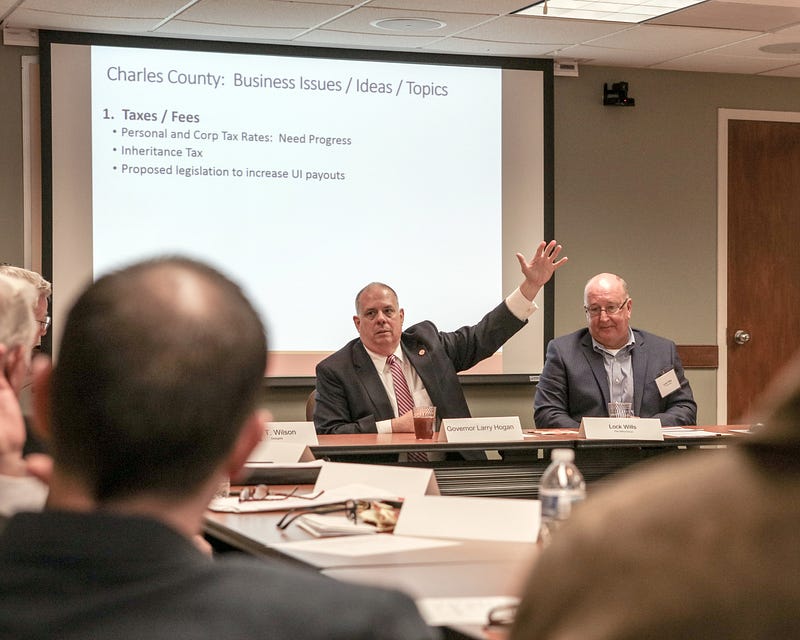Gov. Hogan Finally Funded Public Schools. Why? $40 Million in Corporate Welfare.
And other legislative updates in MSEA’s Up the Street.

THIS MONTH IN ANNAPOLIS
Gov. Hogan Finally Agrees to $20 Million for Public Schools (In Exchange for $40 Million in Corporate Welfare)
Back in August, Gov. Hogan announced that he would not release $25 million for public schools because of a downturn in state revenue projections caused by a sluggish state economy. His budget secretary claimed at the time that it would be “shortsighted” to spend money that should go into the state’s savings account. Of course, that claim of fiscal responsibility fell pretty flat when Moody’s cited his decision as a “credit negative” for 22 of Maryland’s county governments.
Turns out, he really just needed the education funding as a bargaining chip so he could go to bat for two large corporations: Northrop Grumman and Marriott. On Tuesday night, Senate President Mike Miller (D-Calvert, Charles, and Prince George’s-District 27) and House Speaker Michael Bush (D-Anne Arundel-District 30A) announced that Gov. Hogan agreed to sign legislation sending $20 million to public schools to help them fund educator pensions in return for legislative approval of a $20 million grant for Northrop Grumman, a national defense contractor that already won approval of $37.5 million in tax credits over the next five years. The presiding officers also agreed to round up legislative support for the governor’s incentive package for Marriott, including a $20 million loan.
This isn’t the first time Gov. Hogan has tied up public education funding as a negotiation strategy. In 2015, after the General Assembly reversed his budget proposal to cut public schools by roughly $600 million over four years, the governor threatened to withhold $68 million if the legislature didn’t pass his entire legislative agenda. When the General Assembly didn’t give in, he followed through on his threat — causing class sizes to grow and programs to be cut in counties eligible for the Geographic Cost of Education Index.
Trump’s Win Fuels 22 Hate Incidents in Maryland, Gov. Hogan Declines to Condemn
According to the Southern Poverty Law Center, Maryland has seen 22 incidents of reported hate speech or crimes following the 2016 election, many of which have taken place in Maryland schools. In response, Maryland Attorney General Brian Frosh set up a hotline for victims to report incidents to law enforcement, which received a dozen calls in its first week. When asked about the incidents, Gov. Hogan barely confirmed the hate speech and crimes, saying, “Some things are happening across the state,” and that he couldn’t recall any instances besides a Trump supporter getting beaten up at a protest march. Nationally, NEA joined more than 100 other groups to call on President-Elect Trump to denounce the more than 800 incidents of hate-fueled acts inspired by his election.
Kirwan Commission Has Second Meeting, Won’t Make Any Recommendations for 2017 General Assembly Session
Thornton II. The Commission on Innovation and Excellence in Education. The Kirwan Commission. We’ve called the new state panel on education funding a lot of different names (note: most people have settled on Kirwan Commission now), but its charge is vital to the enactment of many important improvements to public education in Maryland. It held its second meeting last month, and invited several national advocates and experts from other states to present their findings on how funding — and how that funding is used — can make a real difference in student achievement.
Consultants hired by the Maryland State Department of Education have finished their adequacy study of Maryland’s school funding formula and are scheduled to present their recommendations to the Commission on December 8. They are expected to propose an increase of $1.9 billion in state aid to local school districts, as well as universal pre-K for all four-year-olds. Commission Chair Brit Kirwan has said that the panel will wait until its final report in December 2017 to submit recommendations to the General Assembly.

